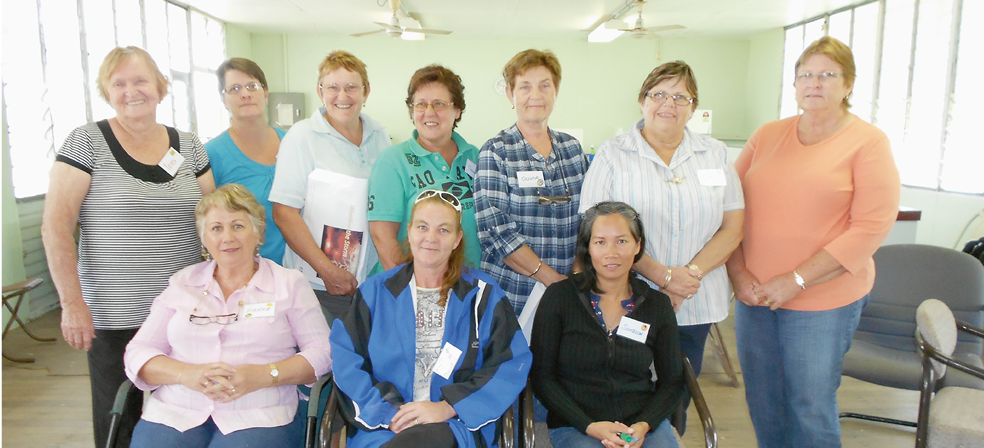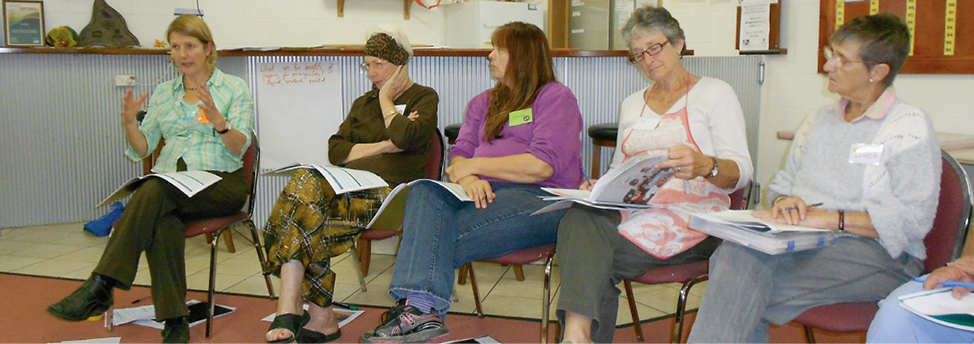Practical stories: Weather the storm – women prepare
National Rural Women's Coalition (NRWC)
Weather the Storm is a project of the National Rural Women's Coalition. It brought women in communities together to discuss, plan and support each other to be more prepared for disasters that might threaten the local area.
Article
While natural disasters such as fire and flood may make headlines, there are many other potential disasters that are sometimes overlooked. Prolonged loss of electricity, water or food supplies, pollution or chemical spills, pandemics and strike action are all possibilities.
Weather the Storm was a trial program that ran from July 2011 to June 2012. Its aim was to bring women together to identify and understand what needed to be done to prepare households and communities to manage through natural and other disaster events and build resilience in recovery.
Weather the Storm is a project of the National Rural Women’s Coalition. It brought women in communities together to discuss, plan and support each other to be more prepared for disasters that might threaten the local area. Participants were able to share personal stories, discuss ideas, consider disasters from many angles, connect and build community, and laugh and touch each other’s hearts.
Women from the Doreen, Victoria and Eungella and Midge Point, near Mackay, North Queensland participated in the program. The program was facilitated over three to five sessions and stimulated conversations about the risks participants faced, their attitudes to the risks, and how they would prepare.
Program values
The program was underpinned by a set of core values.
Gender sensitivity – women are often more comfortable, share more and participate more freely in a group when there are only women and they are able to connect through their shared gender experiences. This means women need tailored opportunities to learn and participate.
Connectedness and safety – building a safe, intimate environment provides a sense of connection, safety and belonging where people can share their lives and know each other at a deeper level. This builds community bonds, encourages participation, and makes learning and change more effective.
Respect – respect for each other’s experiences and life situation builds the trust that, with good information, support and encouragement, women can make the best decisions for themselves and their families.
Conversation – the program tapped into the fundamental experience of communication, where thoughts become stronger when expressed. Like any behaviour change, the company, support and encouragement of others often helps keep us focused and committed.
A program for the willing – the program’s strength is in working with those with a keen interest in the area. We seek to attract women interested in preparing rather than impose the program on groups of women meeting for other reasons.

Image: Amanda Lavarack
Participants from Midge Point.

Image: Amanda Lavarack
Participants from Eungella share stories about living with disaster risk.
Outcomes
The three trial groups (Doreen north of Melbourne, and Eungella and Midge Point near Mackay) decided they wanted to continue meeting as a group.
A post-program survey evaluated the wide range of activities the women had undertaken in preparation for the workshop and provided lists of what they intended to do in the next six months. There was a considerable increase in feeling of safety and a unanimous agreement that the program had strengthened their connections. There were some suggestions for improvement and a 100 per cent support for running the program again and for recommending the program to a friend.
A ‘most significant change’ story evaluation was also done. The following are some of the answers to the question:
‘From your point of view, describe a story that best describes the most significant change that has resulted from your involvement in this program’:
Age 35 – 54 I guess it would be a shift in my way of thinking, in that I now feel a sense of responsibility to my family to protect and provide for them, now that I have been shown the tools. I am now taking steps every week to finalise my emergency plan and prepare my emergency kit.
Age 55+ Having participated these last few weeks, the information we have received has helped to form a bond with the other women. Each of you has given me confidence to get active once again and prepare my emergency plan for my home. Added also is the knowledge that there is an abundance of information available which can be obtained and shared with others who were unable to come to the group meetings…..also my husband has been keen and involved in the process of being prepared and has help in some of the preparations around the house.
Age 55+ I have learned much more about the after effects and how to deal with them.
Age 55+ I now have more contacts and support networks from the community. These ladies have been an inspiration. They have survived and actually blossomed with relating their experiences. I needed to reinforce the idea that we all go through it and can learn from each other.
Age 55+ When I realised that I didn’t know it all even though I have been through several cyclones.
Age 35 – 54 The most significant change I feel for me is the reconnection of the women/group. Bringing back/uniting our community as one. I feel being a part of this program has given me the skills /courage to reconnect in some way with my very manly husband. Very useful skills/ideas were shared.
Age 55+ Reconnection and some new connections to the other local women with prospect of rekindling community spirit. An opportunity to express oneself and be heard without other members jumping ‘down one’s throat’ and continuing meeting and building on this opportunity. A re-motivation to tidy up and prepare at home for any future uncertainties.
Age 55+ People here have been through many experiences and I feel I can turn to them for assistance and help. I have enjoyed getting to know you all. As I spoke today of dialogue you have communicated on a deeper level and it was meaningful.
Age 15 – 34 Since coming to the workshop I look at things differently – especially when I go shopping or look in my pantry. I’ve decided to make more effort to be more in touch with my environment – I’ve come to the conclusion that I have all I need = shopping, accumulating and wanting things that others have is pointless and very unfulfilling.
Meeting and hearing a little bit about the women I’ve met has warmed my heart because they are all very layered and interesting in lots of different ways.
Age 55+ Hearing other ladies stories of stressful situations, of how they coped has helped me to realize we are not alone. There are others who will help me to cope. This back up group is very important.
A Weather the Storm Manual and toolkit has been developed to encourage further deliveries of the program and provide advice for facilitators. It will soon be accessible on the National Rural Women’s Network and Weather the Storm websites.
Further information
Kate Lawrence, Circle Wise.
Email: kate@circlewise.com.au.
Web: National Rural Women’s Network, www.nrwc.com.au.
Web: Weather the Storm, www.weatherthestorm.net.au.


